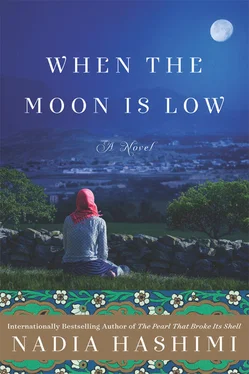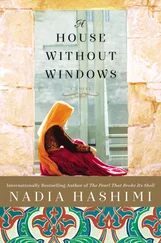In a pouch I’d sewn into my dress was all the money I’d managed to gather by selling off our household belongings. Gone were our dishes, a silver plated tray, a chiming clock. I kept my jewelry in the pouch as well. It was all we had to finance our trip to England. Mahmood had chosen England because we had family there. I wasn’t sure it was the best decision but he insisted.
I did not want to impose on our relatives in England, especially when I didn’t have Mahmood by my side. But to change our destination would be letting a time in my past matter more than it should. I could not afford to be sentimental about material belongings, but I could be as emotional as I wanted about my husband. I wouldn’t change our destination now. I wouldn’t change a thing Mahmood had decided for us. In some way, it made me feel my fingers were still intertwined with his, following his lead.
Besides, I had no better plan in mind. We would go to London.
WE LANDED IN THE SMALL TURKISH TOWN OF INTIKAL, A COZY village skirted by large plots of farmland. The air was clean, and the green landscape reminded me of my father’s orchard. On our first afternoon, we set out to secure shelter. Thankfully, Mahmood had taught Saleem enough English that he was able to communicate with at least some locals. My son’s English was undeniably better than mine.
“Come, Saleem. Let’s go and talk with the men there,” I said, pointing to a group of men coming out of a masjid . I fixed my head scarf. I’d put away the black Iranian burqa to better blend with the dress of this new country. It felt good to wear a simple head scarf. It was like slipping into my past.
“Madar- jan, why don’t you wait here with the little ones. It’s better if I talk to them alone. You don’t speak much English anyway.”
I wanted to disagree.
“I can do this, Madar,” Saleem said, looking straight at me.
I nodded.
I watched on as Saleem walked from one man to the next, each waving him off with a head shake, a scowl, a shrug. Saleem looked around. I saw him toy with the watch on his wrist, glance at it briefly, and survey a group standing near the mosque’s side entrance.
An older man emerged, dressed in a suit that showed the fades and frays of frequent use. Saleem’s eyes were drawn to him as were mine. His stature, his salt-and-pepper hair, and the gentle smile on his face — if my husband had lived another twenty years, he would have looked like this man. Whether Saleem had the same thought or if there was something else about the man that drew him in, I dared not ask. He approached cautiously. The man cocked his ear as Saleem spoke then looked over in our direction, squinting.
The man’s name was Hakan Yilmaz. He and his wife, Hayal, lived in a modest home just a few blocks from the main part of the village. He’d worked for years as a professor of politics while Hayal had been an elementary school teacher. They’d raised two boys, now grown men with families of their own. When the couple retired, they moved back to Intikal to be near Hakan’s sisters and brothers. They were warm and unassuming people — more worldly than their modest village home would indicate. They were the kind of people who saw an Afghan mother traveling with three children and could guess the story behind such a sight.
Saleem had explained to Hakan that we were looking for simple shelter and that we would gladly pay for a brief stay. Hakan put a hand on Saleem’s shoulder and led us to his home where we met his wife, Hayal. Hayal, a petite woman with soft eyes, was delighted to have a babbling baby in their home. Long retired, she still had the presence of a schoolteacher. Her brown hair was tied back into a neat bun and she wore a simple navy blue cotton dress with a small tan sash around her waist. Samira took to her immediately.
They showed us to a small, vacant bedroom with its own door to the outside. We were welcome to use the kitchen, they said, and made no mention of how long we could stay.
My heart found an ally in Hayal, though we did not share a language. In words and gestures she likely did not understand, I explained that I’d been a teacher in Afghanistan before the Taliban and that the children had fallen behind despite my homeschooling efforts.
I nearly sang out with joy when we laid our heads on soft pillows, our full bellies and the kindness of strangers keeping us warm.
THE NEXT MORNING HAYAL BROUGHT OUT A CRATE OF ELEMENTARY math books and stories in English. Samira’s eyes widened with an excitement that thrilled and hurt me. I explained to Hayal that Samira was bright but hadn’t spoken since we’d left home. Hayal seemed to understand, connecting the missing father with my daughter’s mutism. She looked over at Samira and patted the empty chair next to her. Samira sat down as Hayal turned to the first page.
I could hear Saleem in the next room, and though I knew only a handful of English words, I caught that he was talking to Hakan about finding a job. He would work hard, he promised.
I hadn’t spoken to Saleem about working. I stepped away from Hayal and Samira and walked over to the window. Hakan spoke of nearby farms where migrant workers found employment. I wanted to interrupt, but I didn’t.
My thoughts drifted.
I’d had no idea when Mahmood’s hand was first placed in mine what he would come to mean to me. Among the few photographs I’d brought was one from our wedding, a simple ceremony. I’d worn an emerald green dress, pleated from the waist down and with lacy shoulders. My face had been made up by one of KokoGul’s friends. My lips and eyelids were heavy with colors that I would never again wear. Mahmood wore a black suit, the collar of his dress shirt flaring out past the lapels, and a red rose tucked into his breast pocket. Mahmood had looked steadily into the camera, but I stared blankly at the floor.
When I looked at that picture, I wanted to go back in time and tell myself to look at him, my husband. I wanted to tell that bride that she, like the guests eager for a lavish celebration, should rejoice in this union.
He was much more than a husband. It took time for our love to grow but it did, in patches and spurts, fed by the good and bad of the world around us. Every promise we kept, every squeeze of the hand, every secretive smile we exchanged, each crying child we comforted — every one of those moments narrowed the distance between us. By that night, that horrible night when Mahmood was ripped from our lives, the space between us had vanished. We were pressed against each other, a husband and wife bound together not by marriage, but by the harmony of our hearts.
Death could not undo us, I’d learned. My hamsar was with me still. He would watch over us, my beloved husband, as we made our way into tomorrow.
Fate will make things right in the end, though only after the work has been done, the tears have been shed and the sleepless nights have been endured.
I wanted to believe him.
For my family to reach a new life, I would need to rely on Saleem. I would need to admit he was not a child. Mahmood had been better at giving Saleem the space to stretch his wings. I coddled my children, ever afraid of being an inadequate mother. I wanted to do all the things for them that hadn’t been done for me. I wanted them to feel taken care of, loved, and secure. I was failing.
Saleem looked at me differently now. Gone was the boyish sparkle, that trusting gaze that made me feel like I could do no wrong. He stood by my side, not trailing behind. It was time for me to give him the space he needed.
I had brought us this far — from Kabul, through Iran and into Turkey. This had been my journey. My story.
Читать дальше












